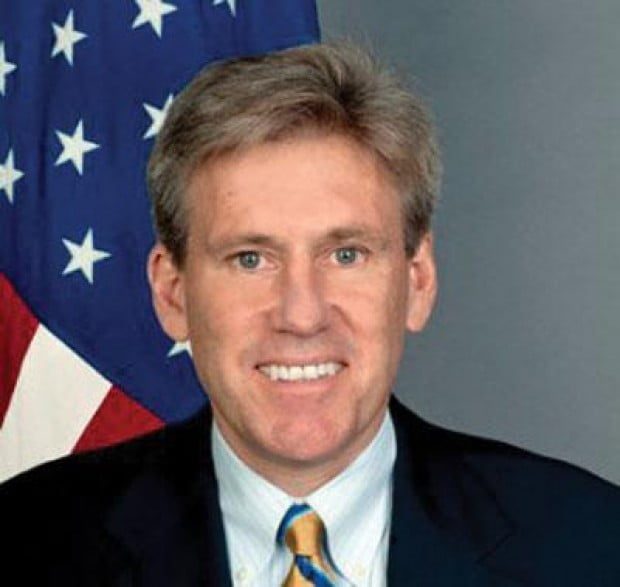Pepperdine law professor Douglas Kmiec was at morning mass a month ago when a fellow parishioner approached him, and asked if he knew the four Americans killed during an overnight attack on the U.S. consulate in Libya.
“I said I wasn’t sure whether I did or not because I hadn’t heard the names,” recalled Kmiec, who served as U.S. ambassador to the Mediterranean island nation of Malta from August 2009 to August 2011. “I was hoping against hope.”
It turned out he knew all but one of the victims.
In spring of 2011 Kmiec came to know American ambassador to Libya Christopher Stevens, who died on Sept. 11 along with three other Americans when militants assaulted the U.S. consulate in the Libyan capital of Benghazi with guns and rocket-propelled grenades.
Stevens was in Malta preparing to enter a Libya in the midst of civil war to overthrow longtime dictator Muammar Gaddafi. Kmiec was the U.S. ambassador to the small Mediterranean island nation that lay just 200 nautical miles north of Libya.
A 30-year veteran of the State Department, Stevens’ assignment in March 2011 was to enter Libya in the rebel stronghold of Benghazi and essentially become the “eyes and ears” of the U.S. Government.
Before meeting Stevens, Kmiec remembered asking his deputy, who had served with Stevens on a previous assignment, what he was like. In addition to a reputation for being somewhat debonair, the tall, slender Stevens was also an idealist.
“He really likes people, he really likes the people of the Middle East, he has a tremendous sense of their potential, their culture and their nature,” Kmiec recalls his deputy telling him. “And he has a flawless grasp of Arabic.”
Media accounts of Stevens after his death characterize him as a unique diplomat, who eschewed staying in armored ambassadorial offices in favor of going out to coffee shops and walking in the streets to be among natives. This quality made him an effective ambassador, but some suggested it also put him at risk.
Kmiec confirmed the impression for himself while Stevens was in Malta. The two civil servants shared daily discussions at the embassy before Stevens left for Libya.
A graduate of UC Berkeley, and the product of the liberal East Bay community of Piedmont, Calif., Stevens was an international trade lawyer by training. Kmiec said during their conversations at the embassy they often discussed how they escaped careers working at large law firms where the volume of paperwork made it hard to tell what one was accomplishing.
“Chris was not a paper person, he was a person who had to interact with flesh and blood and see the tangible results of his work,” Kmiec said.
In March 2011, Stevens was dropped into Benghazi, Libya’s second-largest city and center of rebel resistance, in a Greek fishing vessel. There he provided daily satellite communication to Kmiec’s embassy and others, which was relayed to the U.S. State Department, on how the fighting was going.
“We would get the overnight report from Chris as to who he was meeting with, what progress he was making, whether his assessment was that the fighting was advancing in the rebels’ favor or not,” Kmiec said. “And most importantly, who among the rebels showed the capacity to be trusted and be acknowledged by the United States as a successor government.”
On two questions in particular, whether to release weapons to the rebels and whether to recognize them as a legitimate government, Stephens’ advice to the president and secretary of state in favor of both made a difference in the U.S. deciding to do so, Kmiec said.
The fighting lasted through October, when Gaddafi was killed in his hometown of Sirte. Stephens had to be taken out of the country at least once when it was determined he was not safe, a factor Kmiec said the native Californian was aware of.
“He knew the risks of all this, and I know he knew the risks of all this, because the intelligence briefings that he would be given at our embassy didn’t mince any words about what they knew,” Kmiec said. “And never once did I see Chris say, ‘Gee, I don’t know what I got myself into here.’ It was instead full-speed ahead without any hesitation whatsoever.”
Given the respect and credibility Stevens had garnered from his superiors for his work during the Libyan civil war, Kmiec said the events of last month were potentially a major setback for the country’s relationship with the U.S. In the wake of Stevens’ death, Kmiec suspected it would be a harder sell for politicians and American taxpayers to consider Libya as a prospect for grants or aid, although as a developing democracy Libya sorely needed them.
“But here’s the thing; Chris would say that’s exactly wrong,” Kmiec said. “I’m absolutely convinced that the review of the country that will be done now should listen to that voice, because the voice that Chris reflects is the one that we saw the day after his death, with those thousands of people pouring into [Benghazi’s main] square holding English signs, most of which they probably couldn’t read, but they knew what it said. They were apologizing, asking forgiveness for this thing that these fundamentalists had done in their homeland.”

